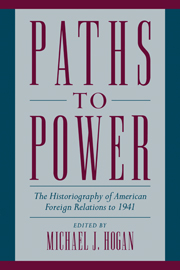Book contents
- Frontmatter
- Dedication
- Contents
- The Authors
- Preface & Acknowledgments
- 1 Introduction
- 2 New Directions in the Study of Early American Foreign Relations
- 3 The Great American Desert Revisited: Recent Literature and Prospects for the Study of American Foreign Relations, 1815-1861
- 4 Coming to Terms with Empire: The Historiography of Late Nineteenth-Century American Foreign Relations
- 5 Symbiosis versus Hegemony: New Directions in the Foreign Relations Historiography of Theodore Roosevelt and William Howard Taft
- 6 The Reclamation of Woodrow Wilson?
- 7 Reaching for the Brass Ring: The Recent Historiography of Interwar American Foreign Relations
- 8 The United States and the European War, 1939-1941: A Historiographical Review
- 9 The Origins of the Second World War in Asia and the Pacific: Synthesis Impossible?
- Index
4 - Coming to Terms with Empire: The Historiography of Late Nineteenth-Century American Foreign Relations
Published online by Cambridge University Press: 12 October 2018
- Frontmatter
- Dedication
- Contents
- The Authors
- Preface & Acknowledgments
- 1 Introduction
- 2 New Directions in the Study of Early American Foreign Relations
- 3 The Great American Desert Revisited: Recent Literature and Prospects for the Study of American Foreign Relations, 1815-1861
- 4 Coming to Terms with Empire: The Historiography of Late Nineteenth-Century American Foreign Relations
- 5 Symbiosis versus Hegemony: New Directions in the Foreign Relations Historiography of Theodore Roosevelt and William Howard Taft
- 6 The Reclamation of Woodrow Wilson?
- 7 Reaching for the Brass Ring: The Recent Historiography of Interwar American Foreign Relations
- 8 The United States and the European War, 1939-1941: A Historiographical Review
- 9 The Origins of the Second World War in Asia and the Pacific: Synthesis Impossible?
- Index
Summary
Over the past twenty years or more there has been a good deal of hand-wringing and soul-searching among historians of American foreign relations about the dismal State of the craft. This selfcriticism, increasingly seconded by specialists in international relations and international history, has centered on the field's traditionalism, narrowness, parochialism, and ethnocentrism. All too frequently nonspecialists, and occasionally even specialists, have dismissed the study of American diplomatic history as a hopeless backwater of scholarly activity and inquiry.
For many diplomatic historians the most unsettling critique of their field was Charles S. Maier's 1980 essay, “Marking Time: The Historiography of International Relations.” A historian of modern Europe, Maier charged that American diplomatic history was a “languishing” field without an innovative methodology, “hobbled” by “overstated dichotomies” and an “intrinsic resistance to new techniques.” In the spring of 1981, at its annual meeting in Detroit, the Organization of American Historians devoted a panel to “The State of Diplomatie History,” and some panel members confronted Maier's charges directly. Spirited responses to Maier's blanket indietment of the craft also appeared in the Fall 1981 issue of Diplomatie History.
Perhaps the most convincing of the immediate replies to Maier's pessimistic assessment of the field were Walter LaFeber's and Joan Hoff-Wilson's. In their rebuttals both Lafeber and Hoff-Wilson charged that he had overlooked exciting new paths of inquiry and methodologies, such as corporatist theory, that had appeared in the 1970s. LaFeber acknowledged Maier's point that American diplomatic history remained a subfield of U.S. history, but maintained that this was “how it should be” because in the twentieth Century the United States was the only nation “that continually exercises power globally while maintaining a liberal System at home” and “the parts cannot be separated.” However, many other scholars, including Warren I. Cohen, editor of Diplomatic History at the time, conceded that Maier's critique was, “in most of its particulars, an aecurate indietment.”
The debate has continued over the past two decades, as American diplomatic historians have searched for ways to revitalize their field. Proponents of a corporatist synthesis, under the leadership of Thomas J. McCormick, Joan Hoff-Wilson, and Michael J. Hogan, temporarily seized the high ground. In an influential 1982 essay entitled “Drift or Mastery? A Corporatist Synthesis for American Diplomatic History,” McCormick confirmed Maier's charges that the field lacked verve, vitality, and excitement.
- Type
- Chapter
- Information
- Paths to PowerThe Historiography of American Foreign Relations to 1941, pp. 79 - 116Publisher: Cambridge University PressPrint publication year: 2000
- 2
- Cited by



